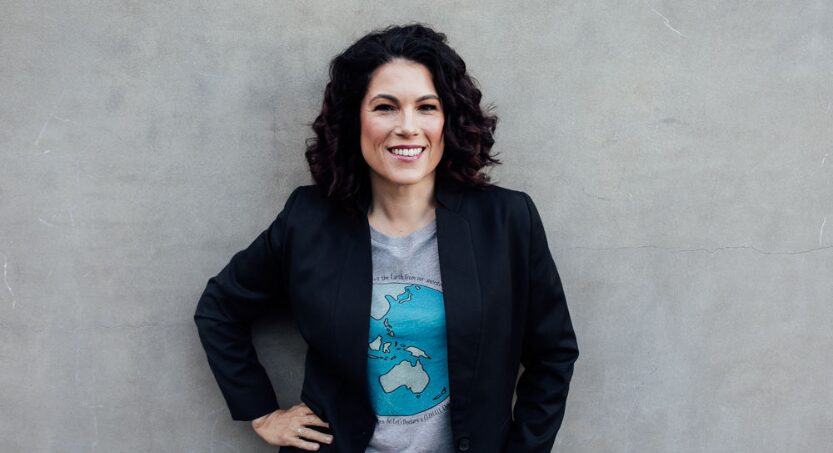Leadership Summit – meet the speakers: Dr Rebecca Huntley unpacks social trends behind the ‘polycrisis’

In the run-up to the Philanthropy Leadership Summit 2025, we talk to keynote speakers about what ‘leadership for our times’ means to them. This week is a fascinating Q&A with one of Australia’s foremost researchers on social trends, Dr Rebecca Huntley. At the Leadership Summit, Rebecca will be sharing insights from her latest research into voter sentiment as well as community expectations about what Australians expect from leadership today.
Read the Philanthropy Leadership Summit 2025 draft program online.
1. Can you provide a couple of key talking points from your research that you’ll unpack at the Philanthropy Leadership Summit?
I want to explore where is the public appetite for real ambition and reform? And the role that governments and philanthropy can play in being a voice and amplifier of that sentiment. While there’s so much to do and in some areas, so little time, there are two issues that require immediate and intense focus. One is the broader question of housing – not just affordability, but accessibility and adaptability.
And the other is climate change. They intersect of course – if we are going to build new houses, how are they going to be as resilient as possible to the impacts of climate change? So, these are areas that philanthropy is already looking at, but they certainly ones that the government will have to address, particularly in this term.
2. What traits and values do Australians want and need in their leaders?
They want to feel listened to and they want leaders to be better at explaining why they act the way they do. They want leaders to be better at making the decisions they make understandable. But connecting those decisions to people’s lived experience is increasingly difficult with the culture of suspicion that has developed in the last few decades around authority and decision-makers in advanced democracies like ours.
There is so much for us to be distracted by today, to pull our attention away from what really matters. I don’t think there’s ever been a more difficult time to be a leader and to have to communicate hard things to an overwhelmed community.
The philanthropic sector is not immune from the culture of suspicion that exists in the community. But what philanthropy has done and can do more is hold our political decision-makers and corporate leaders to account in terms of thinking in the long term. Now more than ever, we need long-term thinking. How do we invest in communities? How do we invest in people in a way that builds social capital? How do we support social cohesion, prosperity and well-being in its broadest sense?
3. What are the key issues Australians want to see bold leadership on?
Definitely housing, mental health and by that, I mean working to improve the social and economic determinants of mental health – they are huge issues that people what to see change. Again, climate change. Whether people accept the climate science of not, it’s widely accepted that we are going to have more extreme weather events in Australia that are going to hit some communities over and over again – in complex ways. So, what’s our whole-of-society response to that?
Then there are other challenges that are shadows on the horizon that people care about – are we becoming a better society or worse society? Is AI going to make life better or worse?
4. You’ve written about how connection to community is now a bigger driver of voter sentiment than traditional political allegiances. What does that mean?
This is my 20th year as a social researcher and when I began, research was more focused around conventional questions of gender, age, income, social and cultural backgrounds etc to understand people. While these are still important, now there are other fundamental questions I ask that provides deeper insights about what shapes people’s worldview – along the lines of ‘how connected do you feel to people around you, your local community, your workplace? What’s your sense of belonging like? Where are you getting your information from? Where are your sources of truth?’
In some ways, we’ve been given a reprieve with the last federal election in Australia. We have a little bit of space and time to think about what kind of society we want to be. Can we fend off the damaging winds of polarisation that we see tearing apart other advanced democracies?
5. How important is strengthening leadership to fend off those damaging winds in Australia?
Strengthening the leadership of civil society is crucial. Our biggest challenge is countering despair. What I’ve seen to be effective time and again against that sense of despair and disempowerment is when people see communities come together.
The ability of small, diverse, motivated groups at the local community level to solve a problem that they had thought was intractable and that has a tangible impact locally gives people a real sense of optimism and hope that something can be done – that they can create change.
Strengthening communities is where philanthropy is and can continue to make a big difference. The expanding community foundation network is very exciting in relation to this. There can be hesitancy from philanthropic leaders to talk about their impact because they worry it looks like they’re tooting their own horn, but good work is happening in this importance sphere – and they need to showcase it more.
Rebecca is the author of books including How to Talk About Climate Change in a Way That Makes a Difference. She is a Fellow of the Women’s Leadership Institute of Australia. Rebecca was a director at Ipsos Australia and is now Director of Research at the agency 89DegreesEast. Read more about Rebecca and the other speakers appearing at the Philanthropy Leadership Summit 2025.